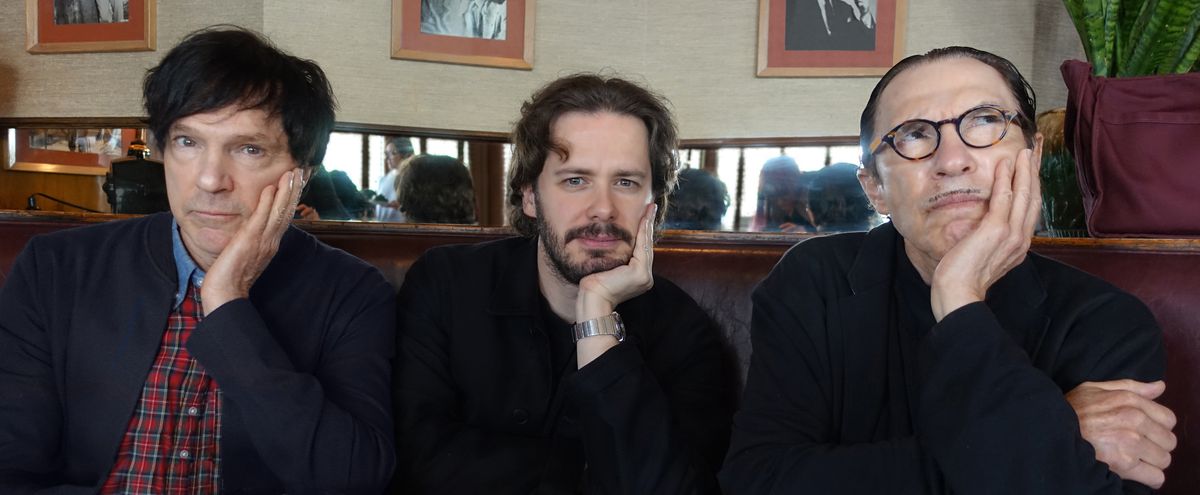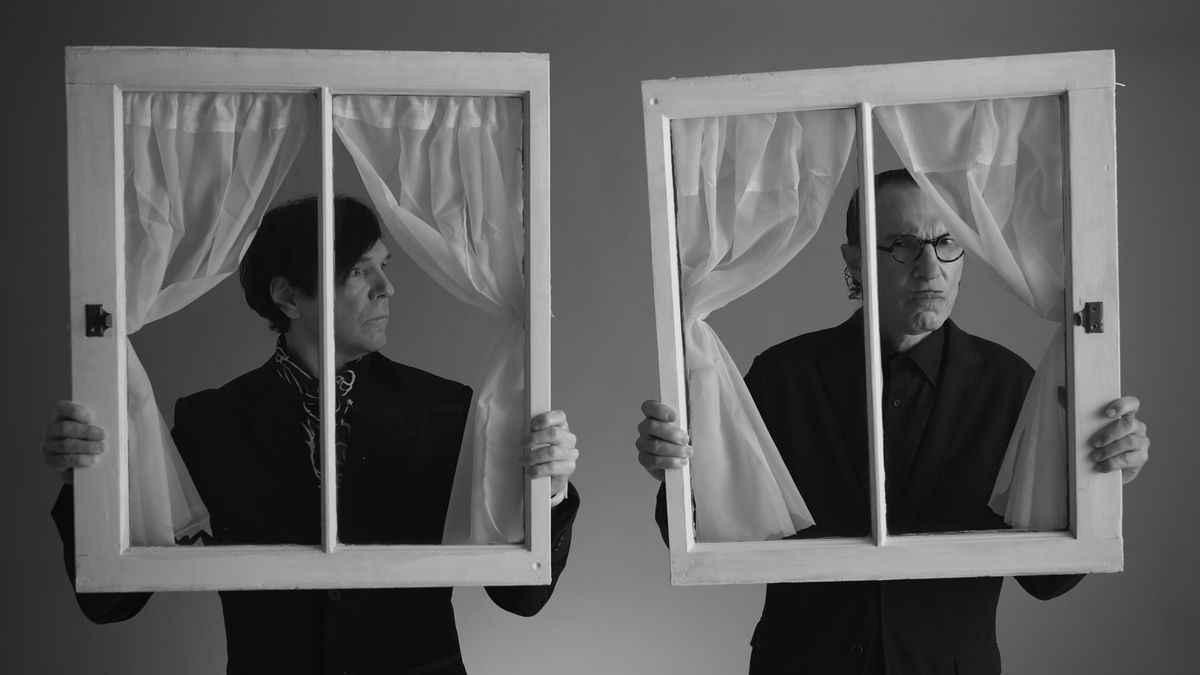For a lot of Edgar Wright fans, the most distinctive thing about his movies has always been the music. From the zombie fight set to Queen’s “Don’t Stop Me Now” in Shaun of the Dead to the various battling bands in Scott Pilgrim Vs. the World to the entire music-based premise of Baby Driver, Wright’s movies are built on pop music as much as pop rhythms.
And he thinks that’s just the way his brain works. “I did a video in 2015 with Pharrell Williams, and he has synesthesia. When he hears or writes music, he sees colors,” Wright tells Polygon. “That started me thinking that I have the movie version of synesthesia, where listening to songs evokes visual images. That’s sort of how Baby Driver came about — I listen to songs and think of scenes.”
And yet he’s never used the music of one of his all-time favorite bands in a film, because that ability wouldn’t work on them. Sparks, the eclectic and deeply eccentric rock band Wright profiles at length in his first documentary, The Sparks Brothers, is something of an obsession for Wright, but he says, “They’re not like wallpaper. Sparks demands your undivided attention.”
Sparks has been struggling for mainstream attention since it launched in 1967, and Sparks brothers Ron and Russell Mael have put out 25 studio albums without ever really breaking through to the big time. Wright has been thinking about that for a long time now. “I tried to use a Sparks song in Hot Fuzz,” he says. “I wanted ‘This Town Ain’t Big Enough for Both of Us’ in the scene where Timothy Dalton and Simon Pegg are fighting in a miniature village. I mean, it makes perfect sense! However, whenever I would put it on, I would find myself not watching the scene, just listening to Sparks. So I thought, ‘Maybe this isn’t gonna work.’”
Instead, he wound up assembling a 140-minute love letter to their career, touching on all 25 albums and bringing in fans from “Weird Al” Yankovic to Neil Gaiman to praise them and talk about how influential their work has been. “The basic structure I had in my head was like, “Where did they come from, a band so unique? What’s in their DNA that inspired the band?’” Wright says.

“Usually, when you’re forming a style, you’re trying to rip something off and you fail, and you create something new. I wanted to ask, ‘Who are they, and what inspired them?’ Their journey became this boulder, gathering up all these other fans, who make music and art derived from them. If you haven’t heard of Sparks, you’ve certainly heard the music of a lot of people in the documentary who are willing to go on record and say, ‘Sparks inspired me.’ That was the story, to me, is that their footprint in music is so huge, and bigger than maybe we can comprehend. As Beck points out at the end of the documentary, there are bands inspired by the bands inspired by Sparks who don’t know that the lineage goes back to them. They fathered all these artists who don’t know who their granddad is … And they’re too modest, in a way, to point that out. They don’t want to be churlish. So I felt like it was my job to show the receipts.”
There’s a funny moment early in Sparks Brothers where Scott Pilgrim actor Jason Schwartzman admits he isn’t sure whether he’s going to want to watch the documentary when it’s completed, because Ron and Russell have been so mysterious over the decades that he’s afraid of learning too much about them and ruining the Sparks experience for himself. Wright also loves their deliberate enigmas, but he was willing to take the risk to make the film, and he says the process didn’t wind up breaking the enchantment for him.
“There’s still enough to talk about in a 50-year career that we can let them have some kind of magic in exactly how it all happens,” he says. “I think that’s one of the reasons people still discuss bands like Sparks fervently, because there’s just a lot to unpack. There are other bands who are massively successful in their heyday, but there’s really nothing to say about The Eagles anymore, is there?” He laughs as he emphasizes that he still enjoys The Eagles’ music, he just feels “there’s nothing else to them, really. But Sparks asks as many questions as it can answer.”
Some of the documentary consists of fan testimonials from a library of musicians and creators, but it also includes narrative segments that walk viewers through the Sparks story. Wright says he had to start shooting before he could figure out how to shape those parts. “Sparks doesn’t have a career with an easy three-act structure,” he says. “Most music documentaries are like rise, fall, and rise. And Sparks is just going up and down all the time like an ECG machine.
“Even after I’d done all the interviews, me and producer George Hencken took the Hollywood beat sheet and said ‘If you were gonna put the story of Sparks into a three-act structure, what would it be like?’ We did sort of figure it out. There’s an obvious low point in the late 1980s where there was no new Sparks album, and they put off everything [while working on a Tim Burton film that eventually fizzled]. They learnt the lesson to not put all their chips on one thing. Suddenly six years have gone by and they’re not a known entity in music anymore. The music scene moves very fast.”

The film also features odd interstitials, where Russell and Ron Mael themselves deliver straight-faced fake Sparks factoids to the camera, or mime out little metaphors for where their careers were at a given point in the story. “I came up with all of those ideas, but they contributed,” Wright says. “Like the FAQ sequence at the start, I wrote the questions, but they wrote all the answers, and they memorized them like actors.”
He says the fake-facts segment was inspired by something the Maels used to do in their own 1970s newsletter. “They claimed in a fan newsletter that they were the sons of Doris Day. It was before the internet, and people believed it for decades,” Wright says. “Another one was, ‘They used to be hand models.’ So there are all these like bullshit facts out and about. So I thought, why not, at the end of the documentary just state a whole bunch of bullshit facts? I think they wrote all of those.”
For the factual parts of the documentary, Wright says he spent about nine hours interviewing the Maels, over four sessions. “They’re very funny,” he says. “They’re really accomplished. And they’re sincere in what they do. They really do believe in the art of writing pop songs. Many other bands that have been going for that long see it as beneath them to try and engage an audience with a four-minute song. And I’ve always been in awe of how Sparks have never shied away from that. And then just how much effort they put into the visuals, and the fact that they can laugh at themselves, that all made them the perfect interviewees, as well as the perfect subject matter.”
Meeting your idols is always a fraught process, but Wright says the Maels weren’t any different from what he expected, once he got close. “Getting to know them — I suspected even before I start that there wasn’t anything behind the curtain. Behind the curtain were Ron and Russell. The line between them and Sparks has become permanently blurred to them as well. They say that in the documentary, and I totally believe it.”
And one of the pleasures of getting to know Russell and Ron was that they share his sense that visuals and music are linked. “Sparks has always had cinematic aspirations, which come through in the music. The songs frequently are like little operas about the tiniest social interaction or observation. They kind of become these little four-minute movies. They have a gift, in a sense, because the way they approach music is not dissimilar to how I’ve done some of my films.
“I’m not saying I’m Jean-Luc Godard. But like Ron says in the documentary, they loved French New Wave films, because Jean-Luc Godard could make movies and also comment about making movies at the same time. And then Sparks has this canny knack of making songs which are utterly sincere in their songwriting and songcraft and emotion, and yet are also self-reflexive. I think it’s one of the things that maybe held them back from a super-mainstream audience, because they’re sometimes a band you have to work, and even decode what exactly they’re getting at.”
The Sparks Brothers is currently in theaters.

Photo: Richie Starzec / Focus Features
Polygon – All
Source link
Related Post:
- Why broken RPGs and in-game jank are my favorite things in gaming
- New Nendoroids revealed: Phoenix Wright and Miles Edgeworth from Ace Attorney, Monika from Doki Doki Literature Club
- Ace Attorney Phoenix Wright and Edgeworth Nendoroids Confirmed
- Phoenix Wright, Miles Edgeworth, And Monika From DDLC Are Getting Nendoroid Figures
- Heaven Burns Red Revealed by Wright Flyer Studios & Key, Written by Jun Maeda; Trailers & Gameplay Released
- Rock Band Releases Classic Rock DLC, Spotlight Hero Update, and Rivals Season 22
- New Genesis Announces Collaboration With Japanese Band Zutomayo
- Crush 40 Guitarist Jun Senoue Talks The Band’s Creation And The Evolution Of Sonic Music
- Battle of the Realms film gets its bloody red band trailer
- Crush 40’s lead singer hints the band is involved in Sonic Movie 2
